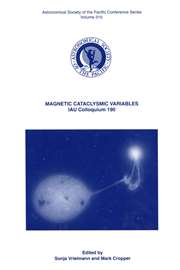Article contents
Links between Symbiotic and Planetary Nebulae
Published online by Cambridge University Press: 22 February 2018
Extract
Planetary nebulae (PNe) represent a well defined stage of stellar evolution, where the characteristics of both, the central star and the gaseous envelope have defined properties. A large fraction of PNe contain binary nuclei, therefore, binary evolution plays an important role in the AGB and proto-planetary stages under certain circumstances. Symbiotic nebulae with extended envelopes (D-type), are identified with binary systems where the primary component is usually a Mira giant and the companion a hot white dwarf. Some of these systems resemble planetary nebulae and as a consequence can lead to misleading interpretations. Here we discuss some relevant links and differences between these two types of nebulae.
- Type
- The Contributed Papers
- Information
- International Astronomical Union Colloquium , Volume 194: Compact binaries in the galaxy and beyond , 2004 , pp. 226 - 227
- Copyright
- Copyright © Instituto de astronomia/revista mexicana de astronomίa y astrofίsica 2004
References
- 1
- Cited by


